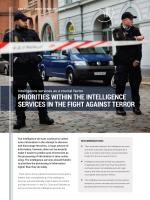Priorities within intelligence services are crucial in the fight against terror
Intelligent services continue to collect information in the attempt to discover and discourage terror, and globally the authorities allocate more money to the intelligent services. In this policy brief major and military analyst Thomas Galasz Nielsen argues for the importance of a well-defined priority between the various types of information in order to prevent terror using the most effective means.
Thomas Galasz Nielsen rests his analysis on experiences from intelligence work in Pakistan, China and the US. In those countries the strengthening of the intelligent services has led to a tougher approach to terror prevention and less focus on why terror emerges and how it may be counter-measured. In the light of this, he has three recommendations:
- The cooperation between the intelligence services and other authorities should be strengthened in order to combine information and provide better insight into the root causes of terror.
- Intelligence should be divided into categories of plausible acts of terrorism that the authorities should prevent immediately and with tough means, and other issues that can be resolved with more gentle and long-term efforts.
- The intelligence services should priorities tactical analysis to prevent imminent acts of terrorism and generally prevent terrorism from happening.


